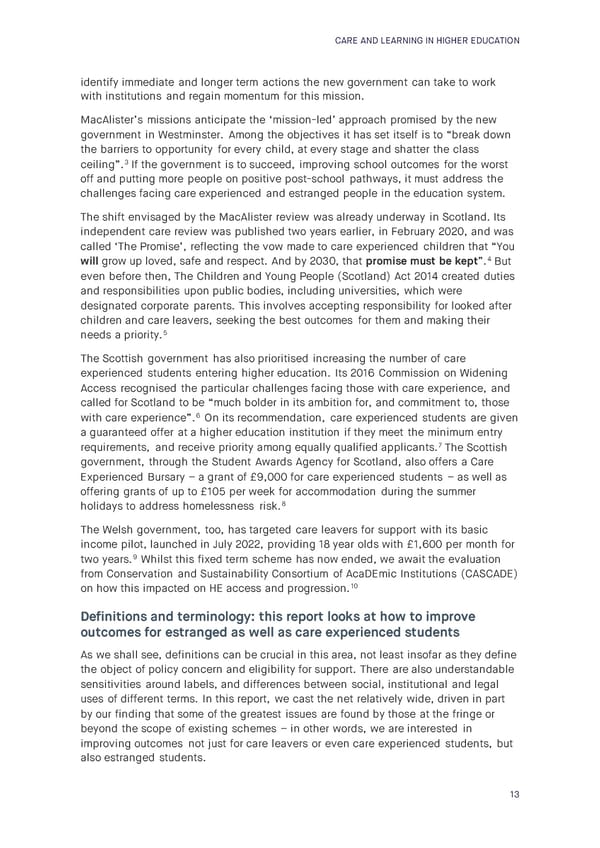CARE AND LEARNING IN HIGHER EDUCATION identify immediate and longer term actions the new government can take to work with institutions and regain momentum for this mission. MacAlister’s missions anticipate the ‘mission-led’ approach promised by the new government in Westminster. Among the objectives it has set itself is to “break down the barriers to opportunity for every child, at every stage and shatter the class 3 ceiling”. If the government is to succeed, improving school outcomes for the worst off and putting more people on positive post-school pathways, it must address the challenges facing care experienced and estranged people in the education system. The shift envisaged by the MacAlister review was already underway in Scotland. Its independent care review was published two years earlier, in February 2020, and was called ‘The Promise’, reflecting the vow made to care experienced children that “You will grow up loved, safe and respect. And by 2030, that promise must be kept”.4 But even before then, The Children and Young People (Scotland) Act 2014 created duties and responsibilities upon public bodies, including universities, which were designated corporate parents. This involves accepting responsibility for looked after children and care leavers, seeking the best outcomes for them and making their needs a priority.5 The Scottish government has also prioritised increasing the number of care experienced students entering higher education. Its 2016 Commission on Widening Access recognised the particular challenges facing those with care experience, and called for Scotland to be “much bolder in its ambition for, and commitment to, those with care experience”.6 On its recommendation, care experienced students are given a guaranteed offer at a higher education institution if they meet the minimum entry requirements, and receive priority among equally qualified applicants.7 The Scottish government, through the Student Awards Agency for Scotland, also offers a Care Experienced Bursary – a grant of £9,000 for care experienced students – as well as offering grants of up to £105 per week for accommodation during the summer holidays to address homelessness risk.8 The Welsh government, too, has targeted care leavers for support with its basic income pilot, launched in July 2022, providing 18 year olds with £1,600 per month for two years.9 Whilst this fixed term scheme has now ended, we await the evaluation from Conservation and Sustainability Consortium of AcaDEmic Institutions (CASCADE) on how this impacted on HE access and progression.10 Definitions and terminology: this report looks at how to improve outcomes for estranged as well as care experienced students As we shall see, definitions can be crucial in this area, not least insofar as they define the object of policy concern and eligibility for support. There are also understandable sensitivities around labels, and differences between social, institutional and legal uses of different terms. In this report, we cast the net relatively wide, driven in part by our finding that some of the greatest issues are found by those at the fringe or beyond the scope of existing schemes – in other words, we are interested in improving outcomes not just for care leavers or even care experienced students, but also estranged students. 13
 Care and Learning in Higher Education Page 13 Page 15
Care and Learning in Higher Education Page 13 Page 15